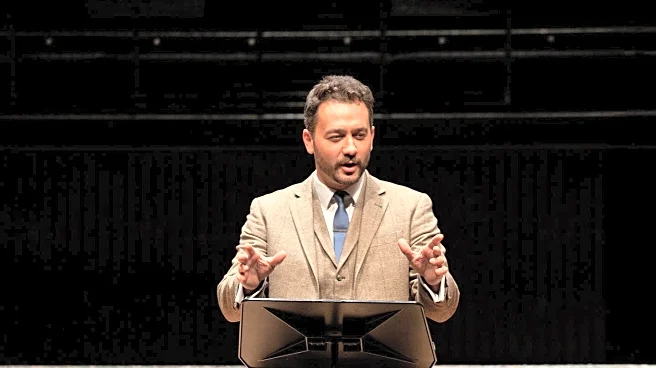What's Happening?
Scottish filmmaker Lynne Ramsay's latest film, 'Die My Love,' starring Jennifer Lawrence and Robert Pattinson, delves into the complexities of maternal rage and mental health. The film, adapted from Ariana
Harwicz's novel 'Matate, amor,' follows the story of Grace, a young mother struggling with postpartum psychosis. Set in a decrepit house filled with memories, Grace's journey is depicted through a series of intense and surreal experiences, highlighting her internal conflict between creativity and motherhood. The film is noted for its evocative imagery and the powerful performances of its lead actors.
Why It's Important?
The film 'Die My Love' addresses significant themes of mental health, particularly postpartum psychosis, a condition that affects many new mothers but is often stigmatized and misunderstood. By bringing this issue to the forefront, the film contributes to a broader conversation about mental health awareness and the challenges faced by women in balancing personal identity with societal expectations of motherhood. The film's exploration of these themes through a cinematic lens can foster empathy and understanding, potentially influencing public discourse and policy regarding mental health support for mothers.
What's Next?
As 'Die My Love' premieres in theaters, it is likely to spark discussions among audiences and critics about the portrayal of mental health in media. The film may also influence future projects that aim to tackle similar themes, encouraging filmmakers to explore complex psychological narratives. Additionally, the film's release could lead to increased advocacy for mental health resources and support systems for mothers experiencing postpartum challenges.
Beyond the Headlines
The film's exploration of a woman's struggle with mental health raises questions about societal pressures on women to conform to traditional roles. It challenges viewers to consider the impact of these pressures on individual well-being and the importance of creating supportive environments for women to express their identities freely. The film's narrative also highlights the need for greater representation of women's diverse experiences in media, encouraging a more inclusive and nuanced portrayal of female characters.









